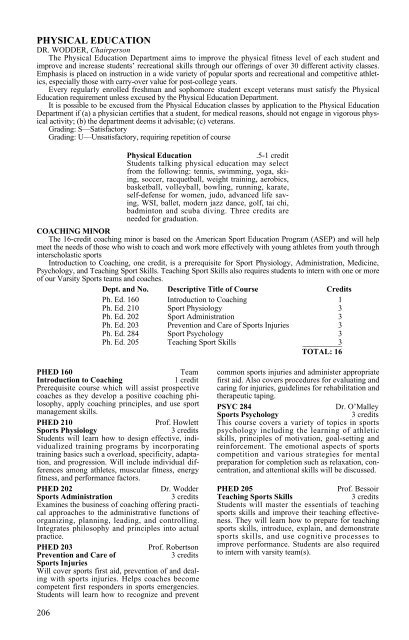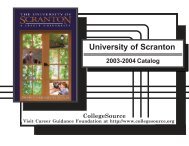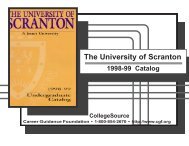You also want an ePaper? Increase the reach of your titles
YUMPU automatically turns print PDFs into web optimized ePapers that Google loves.
PHYSICAL EDUCATION<br />
DR. WODDER, Chairperson<br />
<strong>The</strong> Physical Education Department aims to improve the physical fitness level <strong>of</strong> each student and<br />
improve and increase students’ recreational skills through our <strong>of</strong>ferings <strong>of</strong> over 30 different activity classes.<br />
Emphasis is placed on instruction in a wide variety <strong>of</strong> popular sports and recreational and competitive athletics,<br />
especially those with carry-over value for post-college years.<br />
Every regularly enrolled freshman and sophomore student except veterans must satisfy the Physical<br />
Education requirement unless excused by the Physical Education Department.<br />
It is possible to be excused from the Physical Education classes by application to the Physical Education<br />
Department if (a) a physician certifies that a student, for medical reasons, should not engage in vigorous physical<br />
activity; (b) the department deems it advisable; (c) veterans.<br />
Grading: S—Satisfactory<br />
Grading: U—Unsatisfactory, requiring repetition <strong>of</strong> course<br />
Physical Education .5-1 credit<br />
Students talking physical education may select<br />
from the following: tennis, swimming, yoga, skiing,<br />
soccer, racquetball, weight training, aerobics,<br />
basketball, volleyball, bowling, running, karate,<br />
self-defense for women, judo, advanced life saving,<br />
WSI, ballet, modern jazz dance, golf, tai chi,<br />
badminton and scuba diving. Three credits are<br />
needed for graduation.<br />
COACHING MINOR<br />
<strong>The</strong> 16-credit coaching minor is based on the American Sport Education Program (ASEP) and will help<br />
meet the needs <strong>of</strong> those who wish to coach and work more effectively with young athletes from youth through<br />
interscholastic sports<br />
Introduction to Coaching, one credit, is a prerequisite for Sport Physiology, Administration, Medicine,<br />
Psychology, and Teaching Sport Skills. Teaching Sport Skills also requires students to intern with one or more<br />
<strong>of</strong> our Varsity Sports teams and coaches.<br />
Dept. and No. Descriptive Title <strong>of</strong> Course Credits<br />
Ph. Ed. 160 Introduction to Coaching 1<br />
Ph. Ed. 210 Sport Physiology 3<br />
Ph. Ed. 202 Sport Administration 3<br />
Ph. Ed. 203 Prevention and Care <strong>of</strong> Sports Injuries 3<br />
Ph. Ed. 284 Sport Psychology 3<br />
Ph. Ed. 205 Teaching Sport Skills __________3<br />
TOTAL: 16<br />
PHED 160 Team<br />
Introduction to Coaching 1 credit<br />
Prerequisite course which will assist prospective<br />
coaches as they develop a positive coaching philosophy,<br />
apply coaching principles, and use sport<br />
management skills.<br />
PHED 210 Pr<strong>of</strong>. Howlett<br />
Sports Physiology 3 credits<br />
Students will learn how to design effective, individualized<br />
training programs by incorporating<br />
training basics such a overload, specificity, adaptation,<br />
and progression. Will include individual differences<br />
among athletes, muscular fitness, energy<br />
fitness, and performance factors.<br />
PHED 202 Dr. Wodder<br />
Sports Administration 3 credits<br />
Examines the business <strong>of</strong> coaching <strong>of</strong>fering practical<br />
approaches to the administrative functions <strong>of</strong><br />
organizing, planning, leading, and controlling.<br />
Integrates philosophy and principles into actual<br />
practice.<br />
PHED 203 Pr<strong>of</strong>. Robertson<br />
Prevention and Care <strong>of</strong> 3 credits<br />
Sports Injuries<br />
Will cover sports first aid, prevention <strong>of</strong> and dealing<br />
with sports injuries. Helps coaches become<br />
competent first responders in sports emergencies.<br />
Students will learn how to recognize and prevent<br />
206<br />
common sports injuries and administer appropriate<br />
first aid. Also covers procedures for evaluating and<br />
caring for injuries, guidelines for rehabilitation and<br />
therapeutic taping.<br />
PSYC 284 Dr. O’Malley<br />
Sports Psychology 3 credits<br />
This course covers a variety <strong>of</strong> topics in sports<br />
psychology including the learning <strong>of</strong> athletic<br />
skills, principles <strong>of</strong> motivation, goal-setting and<br />
reinforcement. <strong>The</strong> emotional aspects <strong>of</strong> sports<br />
competition and various strategies for mental<br />
preparation for completion such as relaxation, concentration,<br />
and attentional skills will be discussed.<br />
PHED 205 Pr<strong>of</strong>. Bessoir<br />
Teaching Sports Skills 3 credits<br />
Students will master the essentials <strong>of</strong> teaching<br />
sports skills and improve their teaching effectiveness.<br />
<strong>The</strong>y will learn how to prepare for teaching<br />
sports skills, introduce, explain, and demonstrate<br />
sports skills, and use cognitive processes to<br />
improve performance. Students are also required<br />
to intern with varsity team(s).
















